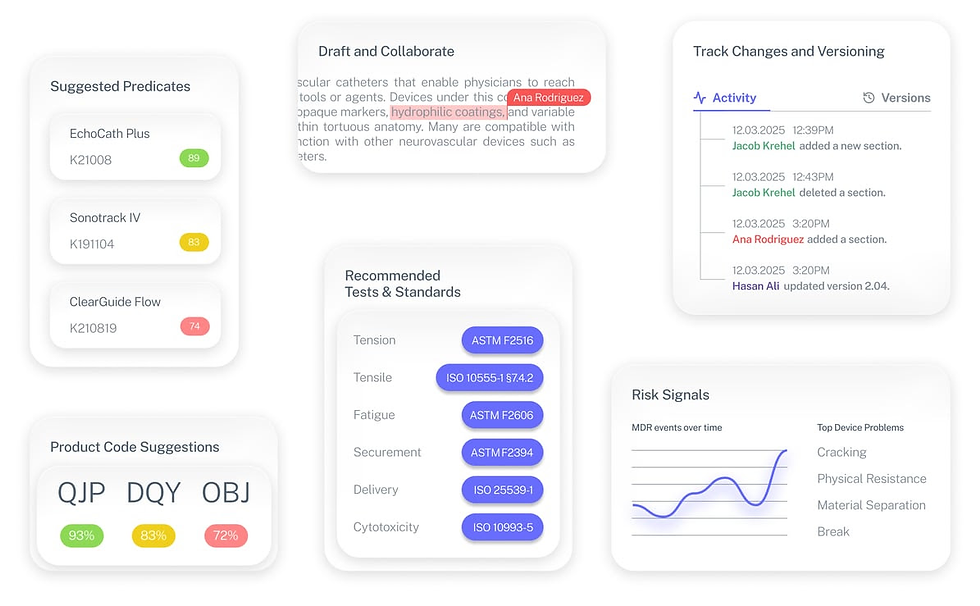The Gentle Singularity in Life Sciences: What Sam Altman's AI Timeline Means for Medical Innovation
- Beng Ee Lim

- Jun 16, 2025
- 4 min read
Updated: Sep 7, 2025
Sam Altman’s June 10, 2025 essay, “The Gentle Singularity,” sketches a near-term AI timeline—2025 agents doing real cognitive work, possible novel-insight systems by 2026, and useful robots by 2027. For life sciences, that points to faster discovery, automated validation, and new trial and manufacturing paradigms—steady shifts with outsized patient impact.

Altman's Timeline for Life Sciences
2025: AI agents handling complex cognitive work (already happening)
2026: AI systems making genuine scientific breakthroughs
2027: Robots managing real-world manufacturing
2030s: "Intelligence too cheap to meter"—AI becomes ubiquitous

2026: When AI Discovers Your Next Breakthrough
An AI system analyzes millions of patient records, genetic data, and molecular interactions. In six months, it identifies a novel therapeutic approach for a critical illness—a discovery that traditionally takes 5-10 years.
R&D Teams:
Traditional drug discovery timelines become obsolete. The challenge shifts from finding targets to validating AI-generated hypotheses and building organizational confidence in machine insights.
Clinical Professionals:
Trial design evolves rapidly. AI-predicted patient responses may replace traditional dose escalation studies. The question becomes: how do you validate treatments discovered by machines?
Business Leaders:
Competitive advantage shifts from having the largest R&D budget to having the best AI integration. Companies that master AI-driven discovery will build insurmountable leads.
The Manufacturing Revolution
AI systems optimize biologics production in real-time, adjusting parameters based on thousands of sensors to prevent batch failures before they occur.
Robots manufacture personalized medical devices on-demand, each designed for a specific patient's anatomy.
Manufacturing Engineers:
The role evolves from optimizing static processes to orchestrating adaptive AI systems that continuously improve performance.
Quality Professionals:
Traditional validation approaches must adapt to processes that optimize themselves. The focus shifts to ensuring AI systems maintain consistent standards while continuously learning.
Operations Teams:
Supply chains become predictive rather than reactive. AI forecasts shortages weeks in advance and automatically adjusts procurement strategies.
The Great Democratization
By the 2030s, Altman predicts AI will be as abundant as electricity.
Small teams will access capabilities that previously required massive pharmaceutical budgets. A startup with ten people could compete with Big Pharma on innovation speed and quality.
Opportunity:
Brilliant ideas won't die due to resource constraints. Innovation barriers drop dramatically.
Challenge:
When everyone has superhuman AI capabilities, competitive advantage must come from elsewhere—strategic vision, execution excellence, and organizational adaptation speed.
Large Companies:
Scale advantages remain in manufacturing, commercialization, and regulatory relationships, but R&D moats may disappear.
Startups:
The playing field levels. Success will depend on how effectively teams collaborate with AI partners.
Preparing for the Transformation
Essential skills for the AI-augmented future:
Strategic thinking: AI handles analysis; humans focus on interpretation, decision-making, and strategic direction.
Cross-functional expertise: The most valuable professionals bridge domains—combining scientific knowledge with AI capabilities, or technical expertise with business strategy.
AI collaboration: Learning to work with AI as a research partner, understanding its capabilities and limitations.
Human-centered leadership: Empathy, creativity, and ethical judgment become more valuable as routine tasks automate.

The Human Element That Matters Most
Despite technological acceleration, Altman emphasizes that fundamental human experiences remain unchanged.
In life sciences, this translates to an unchanged mission: improving human health.
AI accelerates discovery and optimizes processes, but cannot replace the human drive to heal.
It suggests optimal strategies but cannot make the ethical judgments that define responsible innovation.
The organizations that thrive will use AI to amplify human potential in service of better patient outcomes.
Key Questions for the Decade Ahead
How do we maintain innovation leadership when AI capabilities become widely accessible?
How quickly can organizations adapt when technology advances faster than cultural change?
What new business models emerge when drug discovery becomes exponentially faster and cheaper?
How do we ensure equitable access to AI-powered medical innovations?
The most successful life sciences professionals and companies will start experimenting immediately—learning to integrate AI strategically rather than waiting for perfect solutions.
The Opportunity Ahead
Altman calls it a "gentle singularity"—transformation so gradual we barely notice it happening. But the signs are everywhere: AI discovering drug targets, optimizing clinical trials, revolutionizing manufacturing processes.
At Complizen, we believe this transformation represents the greatest opportunity in our industry's history. We're not building AI to replace the brilliant minds driving medical innovation—we're here to amplify them.
To free professionals from repetitive tasks so they can focus on strategic decisions.
The singularity may be gentle, but the opportunity it creates for better patient outcomes is profound. The next decade belongs to those who embrace AI as a partner in improving human health.
The transformation has begun. The question is: will you help shape it?
Ready to explore how AI will transform your work in life sciences? Discover insights and resources for the AI-augmented future at Complizen Learn.
The Fastest Path to Market
No more guesswork. Move from research to a defendable FDA strategy, faster. Backed by FDA sources. Teams report 12 hours saved weekly.
FDA Product Code Finder, find your code in minutes.
510(k) Predicate Intelligence, see likely predicates with 510(k) links.
Risk and Recalls, scan MAUDE and recall patterns.
FDA Tests and Standards, map required tests from your code.
Regulatory Strategy Workspace, pull it into a defendable plan.
👉 Start free at complizen.ai



